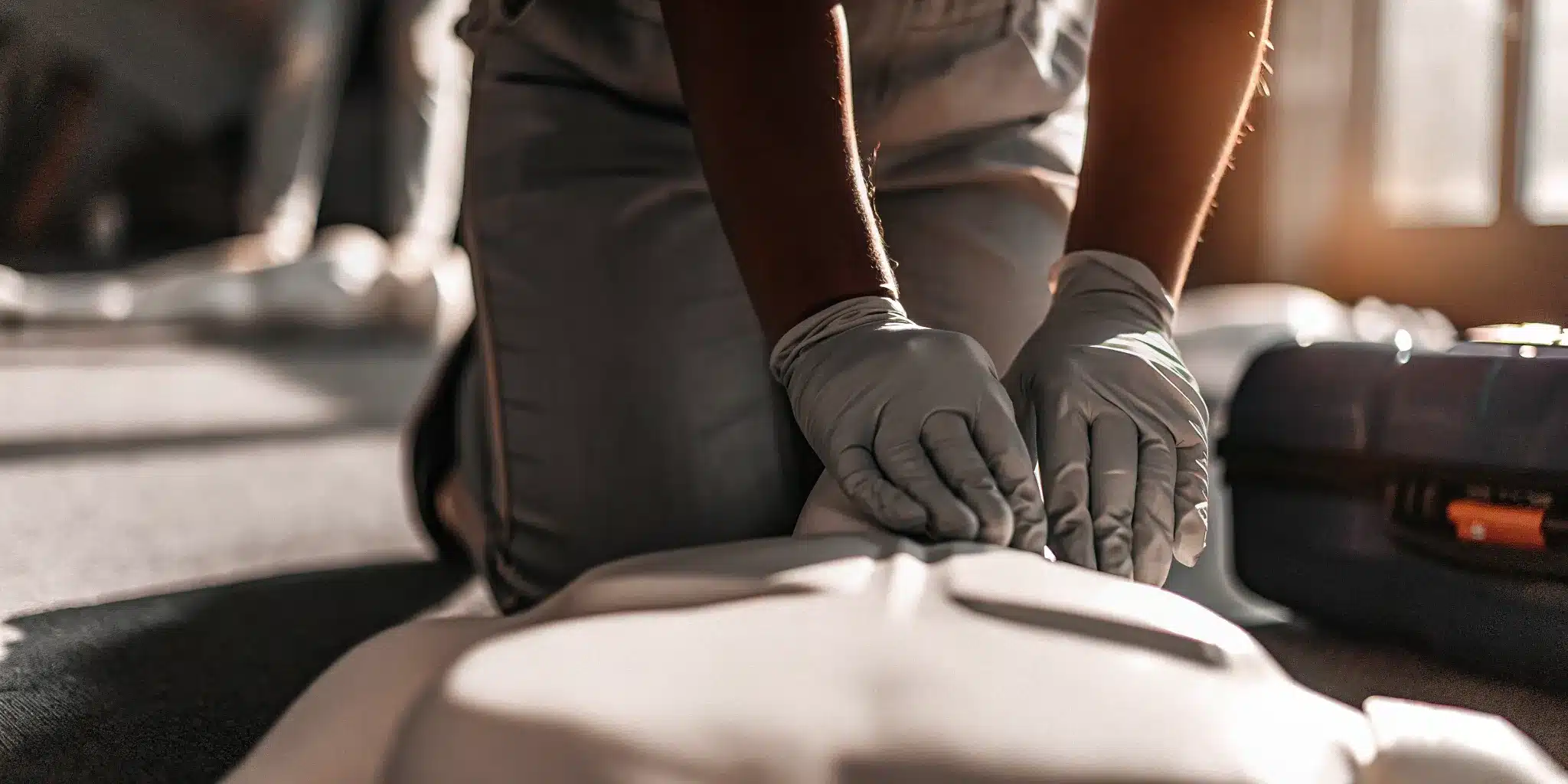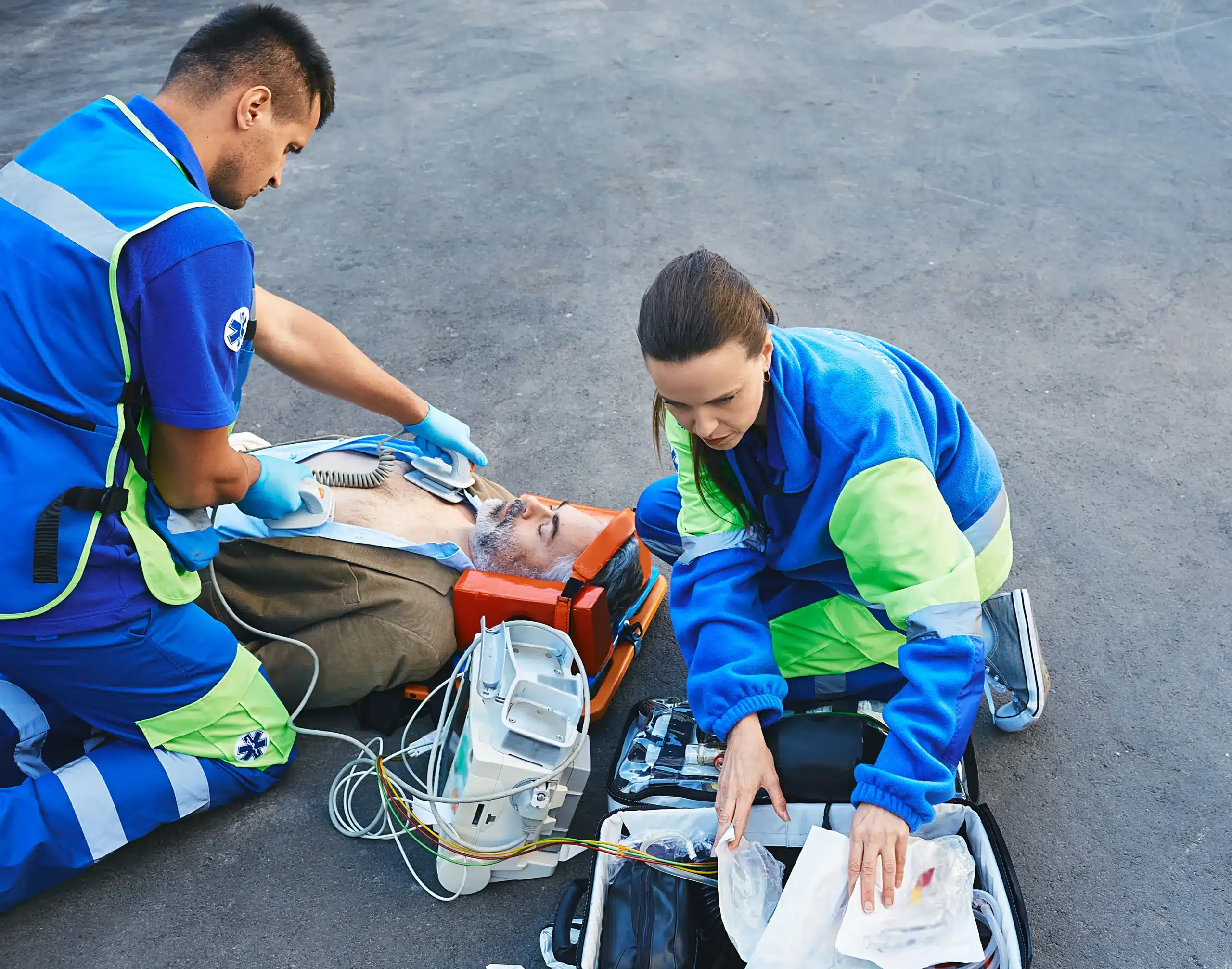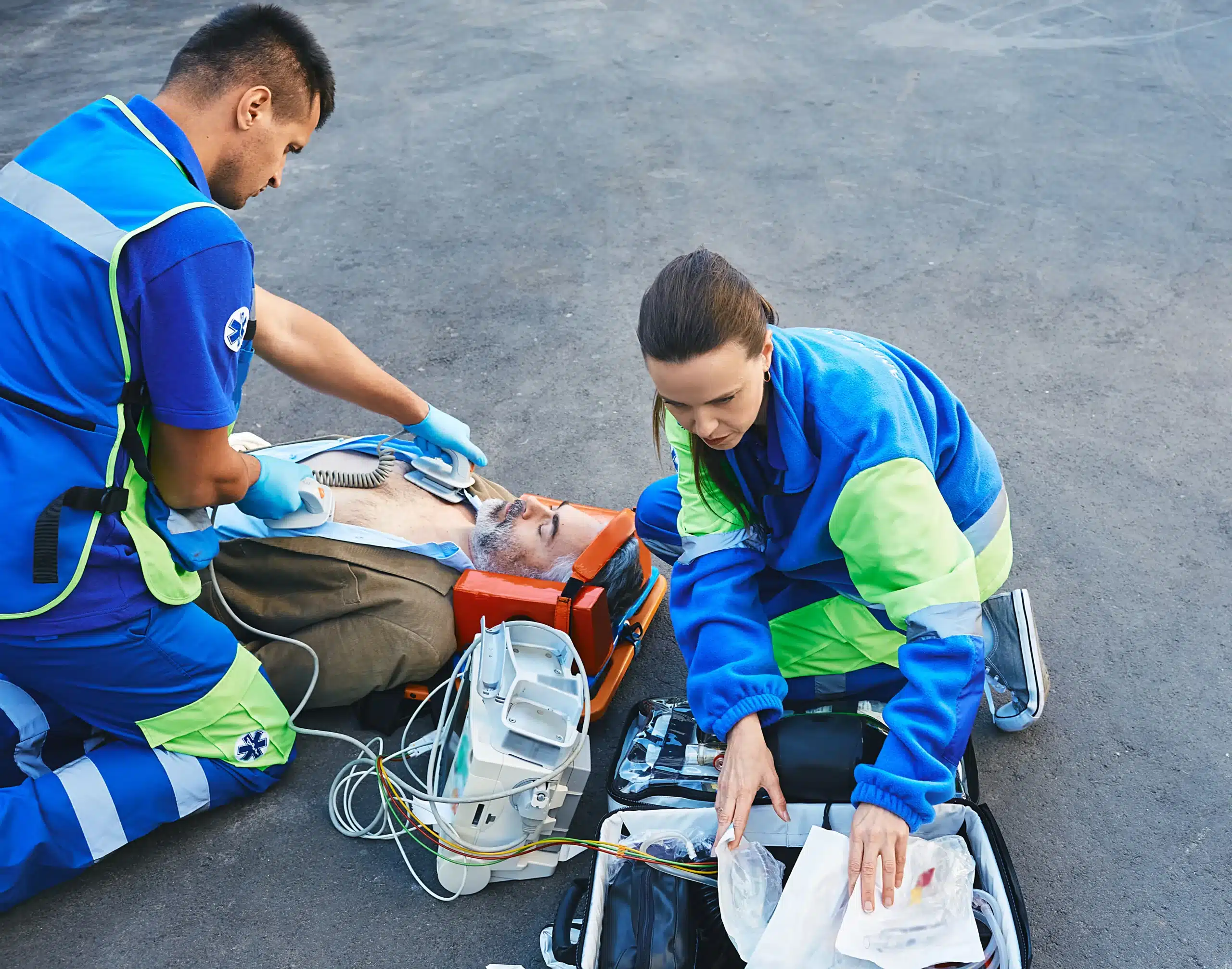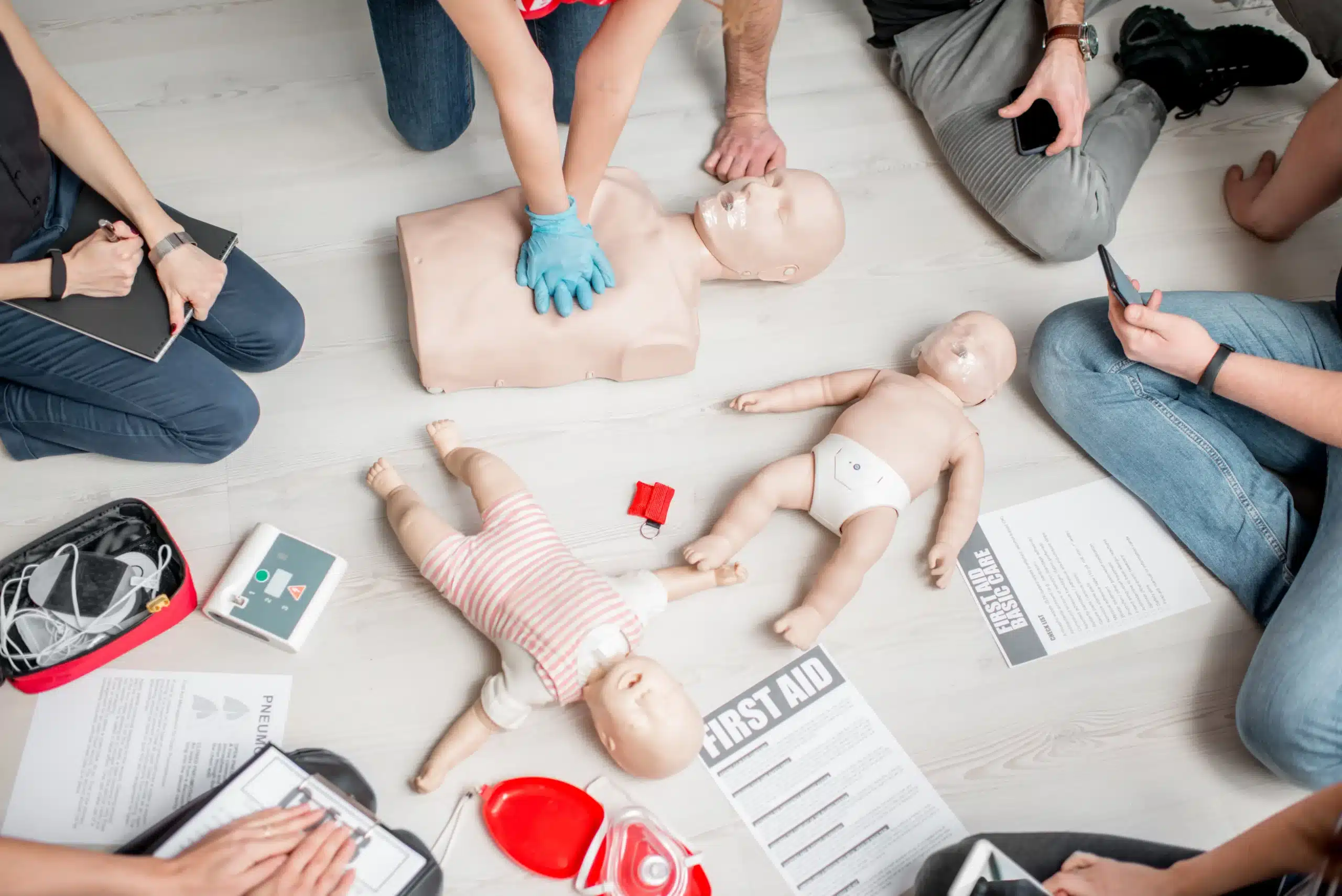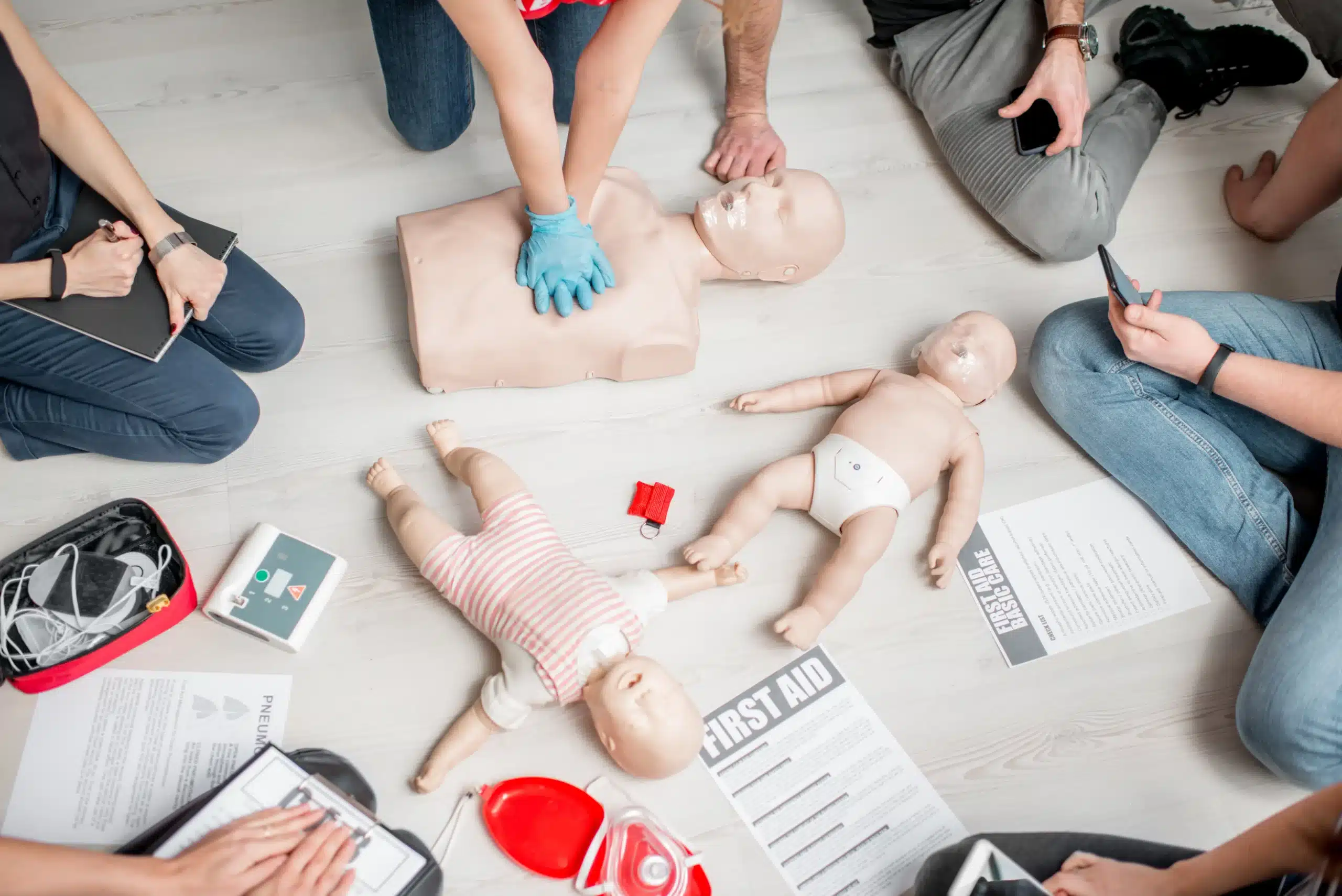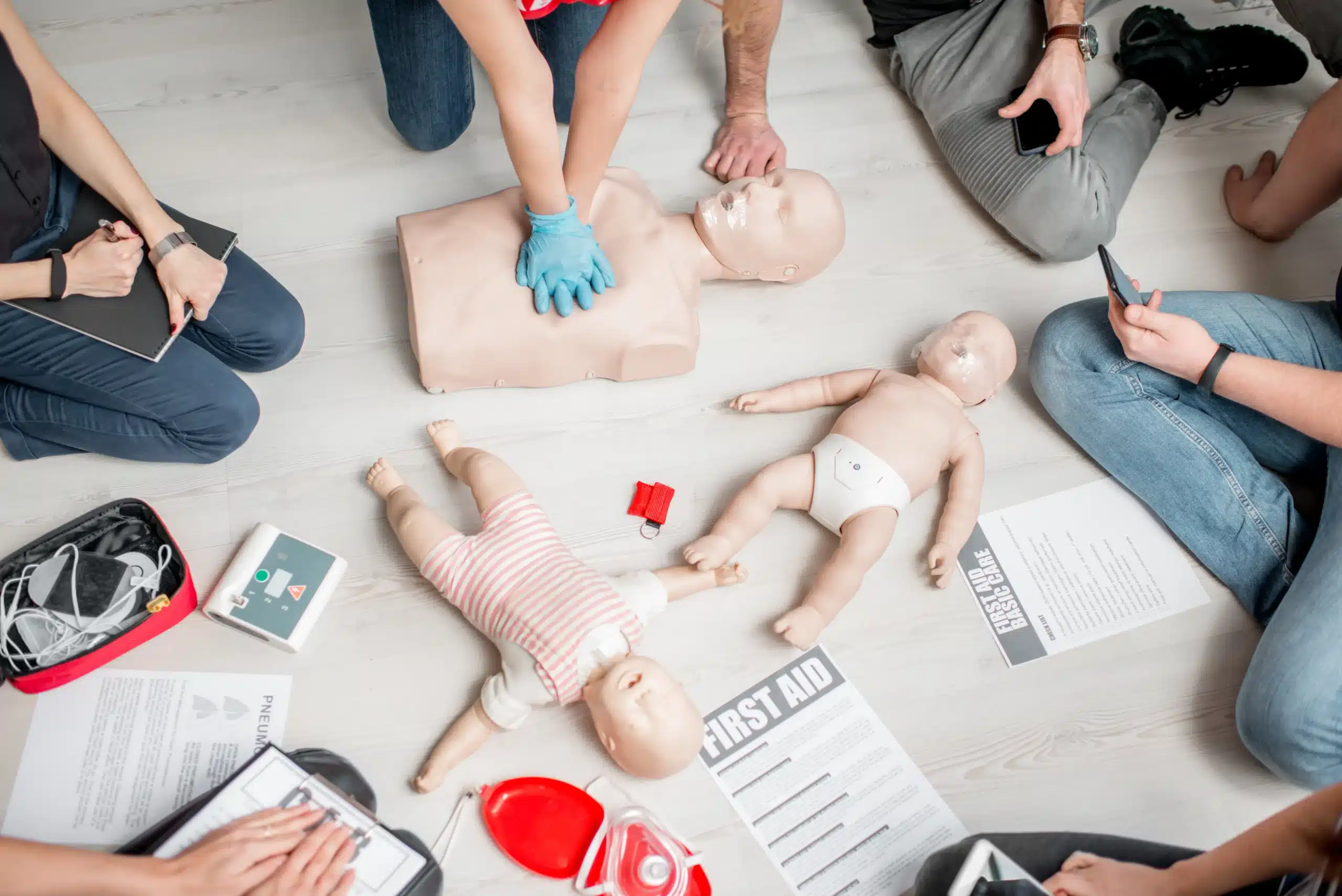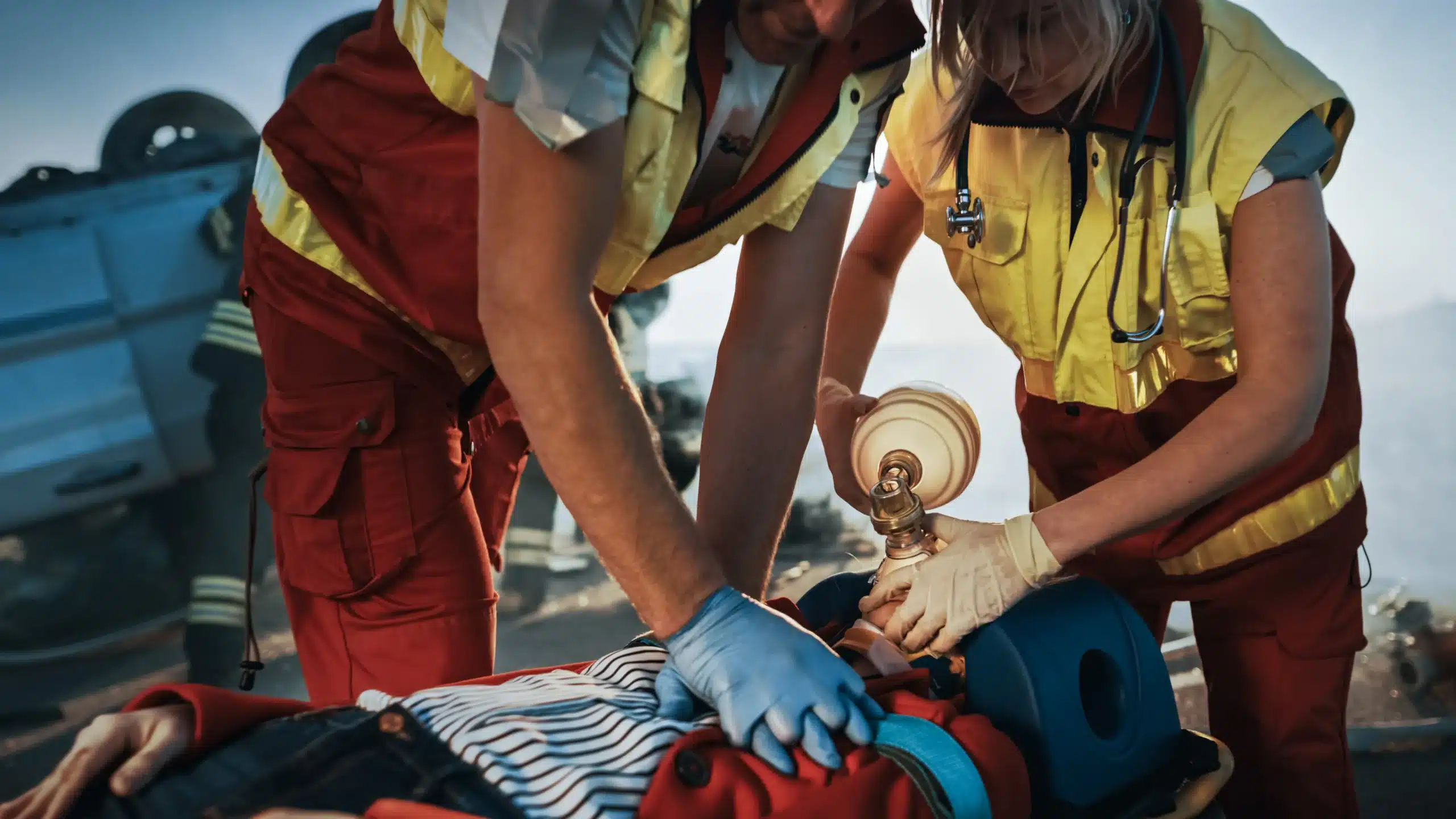Emergencies happen. Are you ready? Knowing what to do in a crisis can make all the difference, especially when seconds count. First aid certification in Walnut Creek empowers you with the skills to respond effectively to various medical situations, from minor injuries to life-threatening emergencies. Whether you’re a concerned parent, a childcare provider, a healthcare professional, or simply someone who wants to be prepared, this training provides valuable knowledge that can save lives. This article explores the importance of first aid certification in Walnut Creek, the different types of training available, how to get certified, and the many benefits it offers. We’ll also address common misconceptions and highlight specific professions where this training is essential.
Key Takeaways
- First aid certification prepares you for the unexpected: Equipping yourself with life-saving skills through a certification course builds confidence and provides peace of mind, knowing you can respond effectively in any situation. Explore options ranging from basic first aid and CPR to specialized certifications like BLS, ACLS, and PALS.
- Select a quality training program: Seek out programs accredited by reputable organizations like the American Heart Association or the American Red Cross. Consider factors such as instructor expertise, comprehensive course content, and convenient scheduling options. Safety Training Seminars offers various courses in Walnut Creek, including BLS, ACLS, PALS, and the EMSA Child Care Health & Safety course.
- Stay current with your skills: Regularly refresh your knowledge and recertify to maintain your skills and ensure you’re prepared for emergencies. The RQI program is a valuable resource for staying up-to-date with certifications like BLS, ACLS, and PALS.
What is First Aid Certification in Walnut Creek?
First Aid certification shows you know how to handle emergencies. It gives you the skills to quickly assess a situation, provide basic care, and keep someone stable until help arrives. This training covers essential techniques like CPR, how to use an AED, and basic emergency response protocols. Whether you’re a beginner or just need a refresher, these courses are designed to be accessible to everyone. Learn more about how CPR and First Aid training saves lives, especially in childcare settings.
Many organizations in Walnut Creek offer these certifications, including the American Heart Association and local training centers like Safety Training Seminars. For those working in childcare or healthcare, First Aid certification is often a legal requirement, ensuring the safety of those in their care. You can find convenient class times, including evenings and weekends, to fit your schedule. Check out our CPR and First Aid certification courses to see how they can benefit you. We also offer an EMSA Child Care Health & Safety course for childcare providers. We offer a low price guarantee on all our courses.
First Aid Certification Classes Available
Finding the right first aid certification course can feel overwhelming with so many options. This section breaks down the different types of first aid and CPR training available in Walnut Creek, so you can choose the best fit for your needs.
CPR and AED Certification
CPR and AED certification teaches you how to recognize and respond to cardiac arrest and other breathing emergencies. You’ll learn chest compressions, rescue breaths, and how to use an automated external defibrillator (AED). This training is essential for anyone, from healthcare providers to concerned citizens. It empowers you to potentially save a life in critical situations. Learn more about CPR and First Aid classes offered by Safety Training Seminars.
Basic First Aid Certification
Basic first aid certification covers a broader range of skills beyond CPR. You’ll learn how to treat common injuries like cuts, burns, sprains, and fractures. You’ll also cover recognizing and responding to medical emergencies like allergic reactions and choking. These basic first aid skills are valuable for everyday life and can make a real difference in helping someone before professional medical help arrives. Providers like CPR Education offer these essential courses.
Pediatric First Aid Certification
If you work with children, pediatric first aid certification is a must. This specialized training focuses on the unique needs of infants and children in medical emergencies. You’ll learn age-appropriate CPR techniques, how to handle common childhood illnesses and injuries, and how to manage emergencies specific to younger age groups. In California, pediatric first aid training often meets licensing requirements for childcare providers, ensuring the safety and well-being of the children in your care. In Home CPR is one resource for this specialized training.
Specialized Certifications
Beyond the core certifications, there are more specialized options for specific career paths or those seeking advanced knowledge.
BLS (Basic Life Support)
BLS certification is designed for healthcare professionals and focuses on team-based resuscitation and advanced airway management. It builds upon the foundation of CPR and AED training, providing a higher level of expertise for those working in healthcare settings. Safety Training Seminars offers BLS certification courses through the American Heart Association.
ACLS (Advanced Cardiovascular Life Support)
ACLS certification is for advanced healthcare providers who manage cardiopulmonary arrest and other cardiovascular emergencies. It involves complex algorithms and advanced life support techniques. Check out Safety Training Seminars’ ACLS courses for more information.
PALS (Pediatric Advanced Life Support)
PALS certification is specifically for healthcare providers who treat critically ill infants and children. Like ACLS, it involves advanced life support techniques tailored to the pediatric population. The RQI program is a popular option for maintaining these certifications. Learn more about PALS and RQI training options available through Safety Training Seminars.
Top First Aid Certification Providers in Walnut Creek
Finding the right first aid certification course can feel overwhelming. To help you, we’ve compiled a list of reputable providers in Walnut Creek. Take a look at what each offers to determine the best fit for your needs.
Safety Training Seminars
Safety Training Seminars is a woman-owned American Heart Association (AHA) Training Center offering various courses, including BLS, ACLS, PALS, CPR, and First Aid. They offer classes daily in Walnut Creek and nearby areas. They also have a low price guarantee and offer the EMSA Child Care Health & Safety course and RQI classes.
American Red Cross
The American Red Cross provides first aid and CPR training to diverse audiences, from healthcare providers to the general public. Their courses offer a solid foundation in emergency response. Check their website for current class schedules and offerings in Walnut Creek.
CPR Education
CPR Education specializes in CPR training in Walnut Creek and surrounding areas. Their location near Treat Boulevard and the Contra Costa Centre is convenient for many. They offer initial certification and renewals for CPR/AED and first aid.
Health & Safety Institute (HSI)
HSI offers various first aid and CPR training programs for different industries. Their courses are known for their quality and preparation for emergencies. Research whether they hold classes in Walnut Creek or primarily serve other locations.
American Heart Association
The American Heart Association (AHA) sets the standards for many CPR and first aid programs. Many training centers, like Safety Training Seminars, are AHA-certified. Choosing an AHA-certified training center ensures high-quality instruction based on the latest medical practices. The AHA offers certifications like BLS, ACLS, and PALS, often required for healthcare professionals.
How to Get First Aid Certified
Getting your first aid certification is straightforward. These five steps will walk you through the process:
Choose a Certification Course
First, identify the right course for your needs. Are you looking for general knowledge or a certification required for your profession? Consider factors like course content, format (online, in-person, or blended), and the certifying organization. For those in or around Walnut Creek, Concord, and Pleasant Hill, Safety Training Seminars offers a range of CPR and first aid certification courses. We also offer more specialized training like BLS, ACLS, and PALS. If you work in childcare, the EMSA Child Care Health & Safety course might be a good fit.
Register and Enroll
Once you’ve chosen a course, register for a session. Many providers offer online registration. Check the course schedule and select a date and time that works for you. Safety Training Seminars offers classes seven days a week to accommodate busy schedules.
Attend the Training
This step involves active participation. You’ll learn essential life-saving skills through demonstrations, practice scenarios, and interactive discussions. Come prepared to engage and ask questions. Some providers, like In Home CPR, even offer training at your home or business.
Complete Skills Assessment
To earn your certification, you’ll need to demonstrate your proficiency. This typically involves a practical skills test where you perform techniques like CPR and first aid on a manikin. The RQI program offered by Safety Training Seminars is a popular option for healthcare professionals seeking BLS, ACLS, and PALS certifications.
Receive Certification
After successfully completing the skills assessment, you’ll receive your official certification card. This card is proof of your training and is typically valid for two years. Remember to keep your certification current by taking a recertification course before it expires. At Safety Training Seminars, students receive AHA certification cards.
First Aid Certification Costs
Knowing the cost of first aid certification helps you budget accordingly. Prices vary based on the type of certification, the training provider, and whether you’re taking a combined course (like CPR and first aid).
Individual Class Prices
Individual first aid certification classes in Walnut Creek typically range from around $50 to $100. For a combined CPR/AED/First Aid course, consider training options like those offered at Walnut Creek CPR for $195 for two people. This bundled approach can be a cost-effective way to gain multiple certifications. Remember that prices can change, so check directly with the provider for current pricing.
Package Deals and Discounts
Many providers offer package deals that combine first aid with other essential life-saving skills like CPR and AED training. These packages are often cheaper than taking each course individually. Safety Training Seminars offers various courses and packages, including BLS, ACLS, and PALS, with a low-price guarantee. For potential discounts on group bookings, corporate training, or for returning students, check with providers like In Home CPR.
Recertification Costs
Recertification is key to maintaining your skills and keeping your certification current. It’s usually less expensive than the initial certification course. CPR Education offers renewal courses in Walnut Creek. Check their site for specific pricing. Like initial certification, recertification costs vary by provider and certification type. When you complete your initial training, ask about recertification options and costs.
Benefits of First Aid Certification
Knowing what to do in a medical emergency can make all the difference. A first aid certification equips you with the skills to respond effectively and confidently, offering benefits that extend beyond the certificate itself. Let’s explore some key advantages:
Prepare for Personal Emergencies
Life is unpredictable. Accidents happen at home, on the road, or out and about. With first aid training, you’re prepared to handle a range of situations, from minor cuts and burns to more serious injuries. You’ll learn to assess the scene, provide initial care, and potentially stabilize a person until professional help arrives. This immediate response can significantly impact the outcome, especially for children. Having these skills brings peace of mind, knowing you can act quickly and effectively when it matters most. For more insights, check out this article on how CPR and first aid training have saved lives in childcare settings.
Advance Your Career
First aid certification can open doors to new opportunities and enhance your existing career path. Many professions, especially those involving childcare or healthcare, require or prefer candidates with this training. A first aid certification can make your resume stand out, showcasing your preparedness and ability to handle critical situations. For those working with children, pediatric first aid and CPR training are often essential, demonstrating a commitment to safety and a higher level of professionalism.
Enhance Community Safety
First aid training empowers you to be a valuable asset to your community. You become equipped to assist others in need, whether at a community event, in your neighborhood, or during a larger emergency. This collective preparedness creates a safer environment for everyone. Trained individuals contribute to quicker response times and better outcomes in emergencies, as discussed in this article on the benefits of refresher courses. By getting certified, you’re not just helping yourself, but also contributing to the well-being of those around you.
Meet Requirements
In many fields, first aid certification isn’t just a bonus—it’s a requirement. Certain jobs, particularly in healthcare, childcare, and education, mandate this training to ensure the safety of those under their care. By obtaining the necessary certification, you demonstrate your commitment to fulfilling these crucial obligations and prioritizing safety in your professional role. This training provides caregivers with increased job satisfaction and confidence in their abilities to respond effectively in critical situations.
Choose the Right First Aid Certification Program
Finding the right first aid certification program is crucial for receiving high-quality training that meets industry standards and your specific needs. Here’s what to consider:
Accreditation and Recognition
Look for programs accredited by nationally recognized organizations like the American Heart Association or the American Red Cross. This ensures the program adheres to established guidelines and provides a credible certification. For example, CPR Education offers training programs in Walnut Creek that meet these standards, holding classes near Treat Boulevard and the Contra Costa Centre. Safety Training Seminars is also a trusted local provider, offering various certifications, including BLS, ACLS, and PALS. Choosing an accredited program validates the quality and legitimacy of your certification.
Instructor Qualifications
The quality of your training depends heavily on the instructor’s expertise. Instructors should be certified by a reputable organization and have relevant experience. CPR Education’s instructors, for example, include experienced emergency personnel such as firefighters, EMTs, and paramedics. This real-world experience adds immense value to the training. Safety Training Seminars also has a team of qualified instructors dedicated to providing comprehensive instruction. Verify instructor qualifications to ensure you learn from knowledgeable and experienced professionals.
Course Content and Practice
A good first aid certification course covers essential topics like CPR, AED usage, wound care, and managing common medical emergencies. The program should include hands-on practice sessions to develop your skills and build confidence. Safety Training Seminars emphasizes practical application, allowing you to practice these life-saving techniques. Look for a course that balances theoretical knowledge with practical skills development.
Flexible Scheduling
Life gets busy, so choose a program with flexible scheduling. Look for classes offered on weekends, evenings, or even at your workplace. Some providers, like In Home CPR, offer classes seven days a week, including evenings. Safety Training Seminars also understands the need for flexibility and accommodates various schedules, even offering on-site training. Consider your availability and choose a program that fits your schedule.
Maintain Your First Aid Certification
Keeping your first aid certification current is crucial for providing effective assistance during emergencies. This section covers how to maintain your certification and stay up-to-date with the latest techniques.
Renewal Requirements
First aid certifications, like those from the American Heart Association, are typically valid for two years. This means you’ll need to recertify to maintain your credentials and keep your skills sharp. Check your certification card for the exact expiration date and plan your recertification accordingly.
Continuing Education
While your formal certification might be valid for two years, refreshing your knowledge more frequently is always recommended. Experts suggest reviewing first aid practices every three years and CPR skills annually. This regular practice reinforces what you’ve learned and keeps your responses quick and effective during real emergencies.
Stay Updated
Emergency response procedures and best practices can change, so staying updated is essential. Regularly reviewing current guidelines ensures you’re using the most effective techniques in an emergency. The RQI program offers healthcare professionals in Walnut Creek a convenient way to stay current with certifications like BLS, ACLS, and PALS. Even for those outside the medical field, refresher courses or workshops can boost your confidence and keep your first aid skills sharp.
Common First Aid Certification Misconceptions
Let’s clear up some common misconceptions about first aid certification. These myths can prevent people from getting trained and being prepared for emergencies.
“Only Medical Professionals Need It”
This is a pervasive myth. While medical professionals certainly use their training frequently, first aid skills are valuable for everyone. Emergencies can happen anytime, anywhere—at home, at work, or even out in the community. Knowing how to respond effectively can make a real difference. Wouldn’t you want to be equipped to help a loved one, a colleague, or even a stranger? Basic first aid knowledge empowers you to provide immediate care until professional help arrives. Learn more about the importance of first aid training.
“First Aid Training is Too Hard”
Many people assume first aid training is overly complex or time-consuming. The truth is, basic first aid courses are designed to be accessible and manageable for people from all walks of life. The skills you learn are practical and straightforward, focusing on essential techniques anyone can apply. Our instructors at Safety Training Seminars create a supportive learning environment, breaking down concepts in a clear, easy-to-understand way. Browse our course catalog to find a class that fits your needs.
“Certification is Only for Certain Jobs”
While some professions require first aid certification, the benefits extend far beyond specific job requirements. Having these skills can be an asset in any situation, increasing your confidence and ability to respond to unexpected events. Plus, knowing you can handle an emergency provides peace of mind. Consider getting certified and be prepared for anything.
“You’ll Always Remember”
It’s easy to think that once you’ve learned first aid, you’ll remember it forever. However, like any skill, regular practice and refreshers are essential. Over time, even the most well-learned techniques can fade. Refresher courses help reinforce your knowledge and keep your skills sharp, ensuring you’re ready to respond effectively when it matters most. Our RQI classes offer a convenient way to stay up-to-date.
First Aid Certification by Profession in Walnut Creek
Knowing how to respond to emergencies is a valuable skill, but some professions require official certification. This section explores the importance of first aid certification for various professionals in Walnut Creek. We’ll cover why it’s necessary and how it can benefit your career.
Healthcare Professionals
Healthcare professionals regularly encounter situations requiring immediate medical attention. BLS certification, including CPR training, is often mandatory for those working in healthcare settings like hospitals and clinics in Walnut Creek. These certifications equip professionals with the skills to handle cardiac arrest, respiratory distress, and other emergencies. For students pursuing healthcare careers, obtaining BLS certification is a crucial step towards employment and demonstrates a commitment to patient safety. It’s not just about meeting requirements; it’s about providing the best possible care. Having these credentials can also open doors to more specialized roles and career advancement.
Childcare Providers
For childcare providers, first aid and CPR training are paramount. Children are naturally curious and prone to accidents, making a safe environment essential. First aid and CPR training empowers childcare providers to respond effectively to choking incidents, allergic reactions, injuries, and other unexpected events. Beyond the practical skills, these certifications offer peace of mind and build trust with parents. Consider taking the EMSA Child Care Health & Safety course to further enhance your skills and demonstrate your commitment to child safety.
Workplace Safety Officers
Workplace safety officers play a vital role in ensuring a secure environment for employees. First aid training provides them with the knowledge and skills to handle workplace incidents, from minor cuts and burns to more serious injuries. A proactive approach to workplace safety, including having certified first aid personnel on-site, can minimize the severity of incidents and create a safer work environment. This preparedness not only protects employees but also reduces potential liability for businesses. Investing in first aid training for safety officers demonstrates a commitment to employee well-being and a proactive safety culture.
Fitness Instructors and Coaches
Fitness instructors and coaches guide individuals through physical activities. While exercise is generally beneficial, accidents can happen. First Aid and CPR training equips fitness professionals to respond confidently to medical emergencies that may arise during training sessions or sporting events. Knowing how to administer CPR, treat sprains, or manage a medical crisis until professional help arrives can make a critical difference. This preparedness builds trust with clients and shows you prioritize their safety. It also allows you to respond effectively in emergencies, potentially saving lives.
Related Articles
- CPR & First-aid Classes in Walnut Creek, CA – Walnut Creek CPR Classes
- CPR, BLS, ACLS, PALS, & First-aid Classes in Walnut Creek, CA.
- Course Preparation – Walnut Creek CPR Classes
- RQI Classes in Walnut Creek, CA – Walnut Creek CPR Classes
- AHA PALS Classes in Walnut Creek, CA – Walnut Creek CPR Classes
Frequently Asked Questions
What’s the difference between CPR and First Aid certification?
CPR certification focuses specifically on life-saving techniques for cardiac and breathing emergencies. You’ll learn chest compressions, rescue breaths, and how to use an AED. First Aid certification covers a wider range of emergency situations, from treating minor injuries like cuts and burns to handling more serious issues like allergic reactions and choking. Often, you can take a combined CPR/First Aid course to gain both sets of skills.
How long does it take to get First Aid certified?
The time commitment varies depending on the course type and provider. A basic First Aid course can often be completed in a single day, while more comprehensive training, like BLS or ACLS for healthcare providers, may require a longer commitment. Check with specific training centers in Walnut Creek, like Safety Training Seminars, for their course durations.
How much does First Aid certification cost in Walnut Creek?
Costs depend on the level of certification and the training provider. Basic First Aid courses typically range from $50 to $100. Combined CPR/First Aid courses might offer a slight discount compared to taking each separately. Look for providers like Safety Training Seminars who offer a low-price guarantee. Don’t forget to ask about potential discounts for group bookings or corporate training.
How do I choose the right First Aid certification program?
Consider your specific needs and goals. Are you looking for general knowledge or do you need certification for a particular job? Look for programs accredited by reputable organizations like the American Heart Association or the American Red Cross. Check instructor qualifications and ensure the course offers a good balance of theory and hands-on practice. Flexible scheduling is also a plus.
How do I maintain my First Aid certification?
Most First Aid certifications are valid for two years. You’ll need to take a recertification course before it expires to stay current. Even if your certification hasn’t expired, it’s a good idea to refresh your knowledge regularly. Consider taking refresher courses or workshops to keep your skills sharp and your confidence high. For healthcare professionals, programs like RQI offer a convenient way to maintain certifications like BLS, ACLS, and PALS.
This article was written for free by MEGA SEO.
